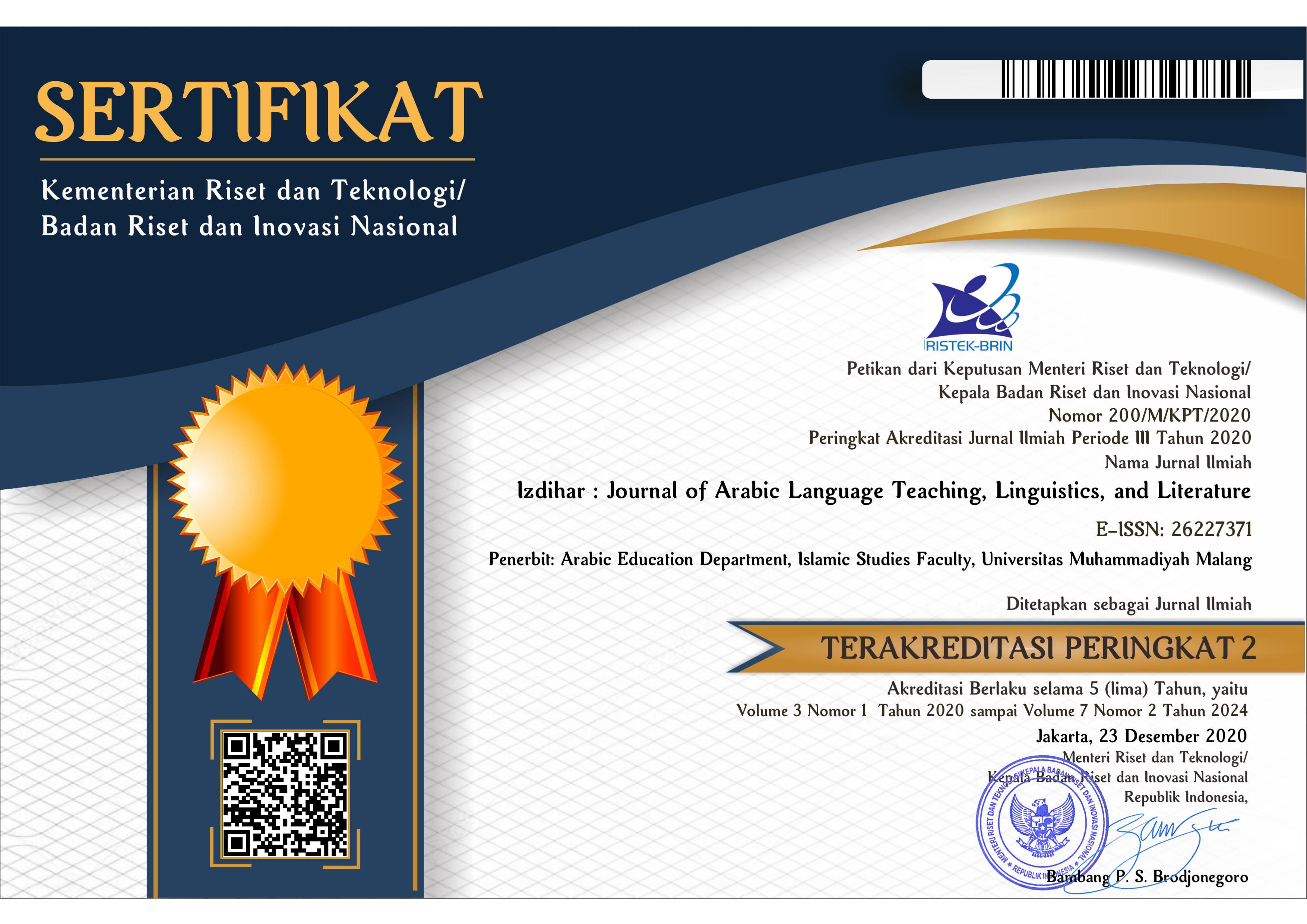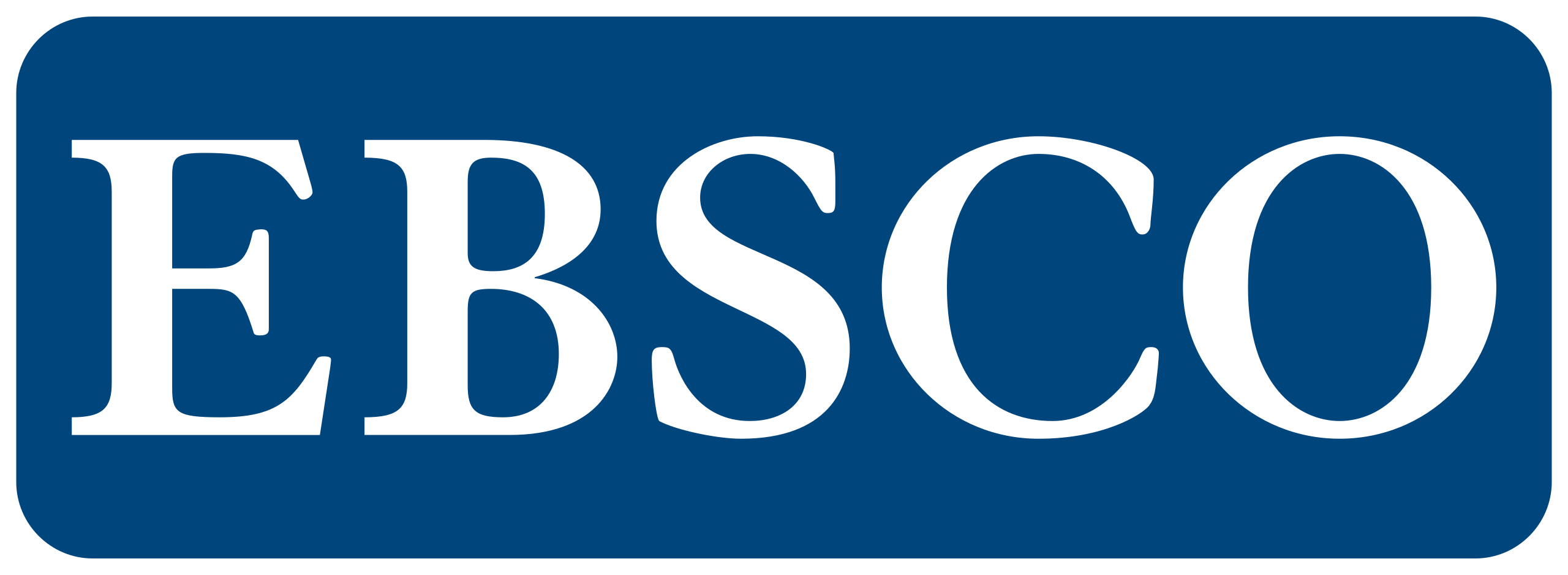Effectiveness of Al-Thariqah Al-Intiqaiyyah in Improving Arabic Learning Outcomes for Islamic Senior High School Students
DOI:
https://doi.org/10.22219/jiz.v2i3.10108Keywords:
Al-Thariqah Al-Intiqaiyyah, Arabic Language, Effectiveness, Outcomes LearningAbstract
This study aims to determine the effectiveness of learning Arabic in improving learning outcomes by using Al-Thariqah Al-Intiqaiyyah in tenth class of science major at Islamic Senior High School 3 Jombang. This study used a quasi-experimental method with a non-equivalent control group pre-test post-test design. The population in this study were all tenth classes of science major at Islamic Senior High School 3 Jombang while the sample was tenth class of science major 8 as a control class and tenth class of science major 6 as an experimental class. Data were analyzed descriptively and inferentially. From the test data, it can be seen that the average outcomes of the experimental class and the control class has increased. The average pre-test score of the control class was 55.25 and the average post-test score was 79.25 while the average pre-test score of the experimental class was 55.25 and the average post-test score was 87. Based on the results of the SPSS 16.0 analysis, sig values were obtained. (2-tailed) of the experimental class and the control class post-test was 0.00 which means less than 0.05. So it can be concluded that H1 is accepted then there is a significant difference between the experimental class post-test and the control class post-test. H1 acceptance proves that Al-Thariqah Al-Intiqaiyyah was effective in improving Arabic learning outcomes in tenth class of science major at Islamic Senior High School 3 Jombang.
Downloads
References
Awaluddin, A. F. (2018). Pengaruh Pembelajaran Metode Eklektik terhadap Hasil Belalajar Bahasa Arab Siswa Madrasah Ma’had Hadits Al-Junaidiyah Biru Bone. Didaktika : Jurnal Kependidikan, 12(2), 151–167.
Ayatullah, A. (2016). Penerapan Metode Eklektik pada Pembelajaran Bahasa Arab Siswa Kelas VI SDIT Anak Sholeh Mataram. Palapa, 4(1), 149–167. DOI: https://doi.org/10.36088/palapa.v4i1.75
Buhori, B., & Wahidah, B. (2017). Bahasa Arab dan Peradaban Islam: Telaah atas Sejarah Perkembangan Bahasa Arab dalam Lintas Sejarah Peradaban Islam. Jurnal Al-Hikmah: Jurnal Dakwah, 11(1). DOI: https://doi.org/10.24260/al-hikmah.v11i1.822
Echols, J., & Shadily, H. (1997). Kamus Inggris Indonsia (p. 35). Jakarta: Gramedia Pustaka Utama.
Efendi, A. F. (2012). Metodologi Pengajaran Bahasa Arab. Malang: Misykat.
Fauzi, M. F., Buhun, M. F., & Purwadi, A. (2019). The Influence of Teams Games Tournament (TGT) toward Students’ Interest in Arabic Language Learning. Izdihar : Journal of Arabic Language Teaching, Linguistics, and Literature, 2(2), 135–148. DOI: https://doi.org/10.22219/jiz.v2i2.9986
Fransiska, F., & Elmubarok, Z. (2015). Efektivitas Metode Reading Guide Terhadap Keterampilan Membaca Bahasa Arab Siswa Kelas XI IPS MAN Demak. 4(1), 56–60. DOI: https://doi.org/10.15294/la.v4i1.7634
Hakim, M. L. (2017). Pemanfaatan Media Pembelajaran Game Interaktif dalam Pembelajaran Kosakata Bahasa Arab. Arabi: Journal of Arabic Studies, 2(2), 156–162. DOI: http://dx.doi.org/10.24865/ajas.v2i2.56
Khoiriyah, R. L. (2012). Pengaruh Metode Eklektik terhadap Hasil Belajar Keterampilan Berbicara Bahasa Arab Siswa Kelas X MA Manahijul Huda Ngagel Dukuhseti Pati. Lisanul’ Arab: Journal of Arabic Learning and Teaching, 1(1). DOI: https://doi.org/10.15294/la.v1i1.1509
Khuli, M. A. (2010). Strategi Pembelajaran Bahasa Arab. Yogyakarta: Basan Publishing.
Kumar, C. P. (2013). The Eclectic Method- Theory and Its Application to the Learning of English|IJSRP February 2013 Publication. 3(6). http://www.ijsrp.org/research-paper-0613.php?rp=P181291
Kusiyah, T. (2015). Penggunaan Metode Eklektik dalam Pembelajaran Mufradat di Madrasah Ibtidaiyah Darul Hikmah Bantarsoka Purwokerto Barat Tahun Pelajaran 2014/2015. IAIN Purwokerto: Unpublished Undergraduate Thesis.
Latuconsina, S. N. (2018). Efektivitas Permainan Bahasa Arab dalam Meningkatkan Kemampuan Membaca Mahasiswa Program Studi Pendidikan Bahasa Arab. Arabi: Journal of Arabic Studies, 3(2), 145–156. DOI: http://dx.doi.org/10.24865/ajas.v3i2.99
Marlina, L. (2016). Efektifitas Metode Langsung Dalam Pengajaran Keterampilan Berbicara Bahasa Arab. Al-Tsaqafa: Jurnal Ilmiah Peradaban Islam, 13(02), 211–226. DOI: https://doi.org/10.15575/al-tsaqafa.v13i02.1973
Muna, W. (2011). Metodologi Pembelajaran Bahasa Arab. Yogyakarta: Teras.
Mustofa, B., & Hamid, A. (2016). Metode dan Strategi Pembelajaran Bahasa Arab. Malang: UIN Malik Press.
Mustofa, S. (2017). Strategi Pembelajaran Bahasa Arab Inovatif. Malang: UIN Maliki Press.
Mwanza, D. S. (2017). The Eclectic Approach to Language Teaching: Its Conceptualization and Misconceptions. International Journal of Humanities Social Sciences and Education (IJHSSE), 4(2).
Nikmah, K. (2019). Meaning Variations of Qala (قال ) in Indonesian Language. Izdihar : Journal Of Arabic Language Teaching, Linguistics, and Literature, 2(2), 77–100. DOI: https://doi.org/10.15408/bat.v25i1.11506
Purwanto. (2010). Evaluasi Hasil Belajar. Yogyakarta: Pustaka Pelajar.
Rahman, A. A. (2011). Pengajaran Bahasa Arab dengan Metode Eklektik. Jurnal Adabiyah, 11(1), 65–74.
Raswan, R. (2018). Pengaruh Metode Pembelajaran Eklektik Terhadap Hasil Belajar Bahasa Arab Siswa. Arabiyat: Jurnal Pendidikan Bahasa Arab Dan Kebahasaaraban, 5(1), 121–140. DOI: https://doi.org/10.15408/a.v5i1.7007
Ridlo, U. (2015). Bahasa Arab Dalam Pusaran Arus Globalisasi: Antara Pesismisme Dan Optimisme. Ihya Al-Arabiyah: Jurnal Pendidikan Bahasa Dan Sastra Arab, 1(2).
Rifa’i, A. (2015). Implementasi Thariqah Al Intiqaiyyah (Metode Eklektik) pada Pembelajaran Bahasa Arab di MTsN Kediri 1. Realita: Jurnal Penelitian Dan Kebudayaan Islam, 13(2). DOI: https://doi.org/10.30762/realita.v13i2.60
Roviin. (2018). Pengembangan Kurikulum Bahasa Arab di Madrasah. Tarling : Journal of Language Education, 1(2), 1–18. DOI: https://doi.org/10.24090/tarling.v1i2.1248
Sugiyono. (2018). Metode Penelitian Kuantitatif, Kualitatif, dan R&D. Bandung: Alfabeta.
Suja’i. (2010). Inovasi Pembelajaran Bahasa Arab. Semarang: Walisongo Press.
Sudjana, N. (2002). Penilaian Hasil Proses Belajar Mengajar. Bandung: Remaja Rosdakarya.
Sudjana, N. (2010). Dasar-Dasar Proses Belajar Mengajar. Bandung: Sinar Baru Algensindo.
Taufiq, A. (2018). Dafi'iyyah Istikhdam al-Ta'allum al-Ta'awuny li Tanmiyah Ta'lim Maharah al-Kalam. Izdihar : Journal of Arabic Language Teaching, Linguistics, and Literature, 1(1). DOI: https://doi.org/10.22219/izdihar.v1i1.6564
Tim Penyusun Kamus Pembinaan dan Pengembangan Bahasa. (1999). Kamus Besar Bahasa Indonesia. Jakarta: Balai Pustaka.
Downloads
Published
How to Cite
Issue
Section
License
Copyright Notice
Authors who publish with this journal agree to the following terms:
- Authors retain copyright and grant the journal right of first publication with the work simultaneously licensed under a Creative Commons Attribution-ShareAlike 4.0 International License that allows others to share the work with an acknowledgment of the work's authorship and initial publication in this journal.
- Authors are able to enter into separate, additional contractual arrangements for the non-exclusive distribution of the journal's published version of the work (e.g., post it to an institutional repository or publish it in a book), with an acknowledgment of its initial publication in this journal.
- Authors are permitted and encouraged to post their work online (e.g., in institutional repositories or on their website) prior to and during the submission process, as it can lead to productive exchanges, as well as earlier and greater citation of published work (See The Effect of Open Access).
Copyright (c) 2019 Izdihar : Journal of Arabic Language Teaching, Linguistics, and Literature

This work is licensed under a Creative Commons Attribution-ShareAlike 4.0 International License.

















